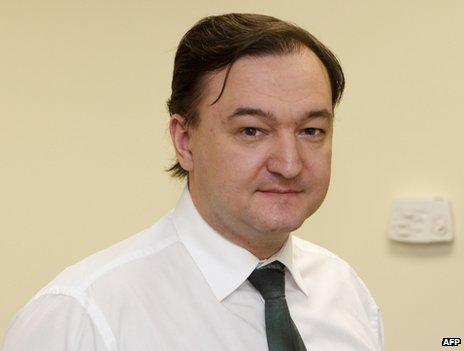Council of Europe moots Magnitsky 'smart sanctions'
- Published

Sergei Magnitsky is seen here in a photo from 2006
A draft report for Europe's top human rights watchdog advocates "intelligent sanctions" over the death of Russian whistleblower Sergei Magnitsky.
Magnitsky died in a Moscow prison after he was arrested while trying to expose tax fraud nearly four years ago.
The Parliamentary Assembly of the Council of Europe report, external accuses the Russian authorities of a cover-up.
But its author, Andreas Gross, said US-style black-listing of Russian officials was counter-productive.
Washington passed legislation known as the Magnitsky Act last year, to withhold visas and freeze financial assets of Russian officials thought to have been involved with human rights violations. The law has been applied to 18 Russian individuals by name, external.
Russia, which is a member of the Europe-wide body, is invited to comment on Mr Gross's findings before the report is submitted for approval in September.
Allegations that Magnitsky was tortured in custody have been rejected by Russian investigators, while attempts to prosecute prison doctors for negligence resulted in no convictions.
One trial which did begin this year is that of the dead man himself, who is being prosecuted posthumously for tax evasion.
Soon after the US Congress passed the Magnitsky Act, external in December, Moscow banned Americans from adopting Russian children, and it recently pressured the Irish Republic, a Council of Europe member, to back down from endorsing the American black list.
Parliaments in several other European countries have also been considering action, following the American example.
'No quick fix'
"I... call on the... Assembly to send a clear signal to the Russian authorities that the cover-up must be reversed and the true culprits must be held to account," Mr Gross, a Swiss Socialist MP, writes.
His report calls on Russia to
fully co-operate with any countries that have opened criminal investigations into money-laundering on the basis of Magnitsky's revelations
hold to account all those who share responsibility for Magnitsky's death
end Magnitsky's posthumous trial for tax evasion
stop "persecuting" company lawyers involved in the affair
It is "in the interest of Russia and of all her hard-working and tax-paying citizens" for the Russian authorities to punish the culprits, he says.
But he rejects the idea of targeted sanctions as envisaged by the US.
Asked by the BBC News website what "intelligent sanctions" might mean, Mr Gross said this could not be decided until the truth about Magnitsky and his work to uncover corruption was established.
However, his report suggests countries might take the British approach of denying entry visas to any persons suspected of having committed serious crimes.
Washington's targeted sanctions, he argued, were a legally dubious "quick fix" which had made it even more difficult to establish the facts as they had fuelled Russian hostility.
"Nothing will change for the better for the Russian people only because 18 people are prevented from entering the United States," he said.
"Such sanctions are as un-smart as military actions when you have no political perspective for overcoming a crisis."
He said they did not serve Magnitsky's goal of stopping the theft of public money and private property in Russia, nor did they help protect people against abuse in Russian prisons.
'Upside-down'
Magnitsky was working as an auditor at a Moscow law firm when he discovered what he said was a massive fraud by tax officials and police officers.
He is said to have uncovered the alleged theft of $230m (£150m). After reporting it to the authorities, he was himself detained in 2008 on suspicion of aiding tax evasion.
He died in custody on 16 November 2009 at the age of 37 of conditions caused by untreated pancreatitis.
Magnitsky's colleagues at the firm, London-based Hermitage Capital Management, say the case against him was fabricated to make him halt his investigations.
"He was a decent man who discovered huge injustices," Mr Gross said on Tuesday. "Instead of being praised for that and being supported, he was unjustly treated and brought to his death. It is totally upside-down. He should have been treated as a hero of Russia."
- Published11 July 2013
- Published2 May 2013
- Published19 March 2013
- Published11 March 2013